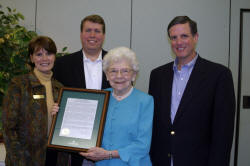18 Oct Jeff Pelley Sentenced to 160 Years
On October 17, Jeff Pelley was sentenced to 160 years in prison for the shotgun slayings of his father, step-mother, and two step-sisters in 1989. Robert Pelley, Jeff’s father, was pastor of the Olive Branch United Brethren church in Lakeville, Ind. (just south of South Bend). The bodies were found in the parsonage the next day, Sunday morning, by parishioners.
Pelley, now 34, was give four consecutive 40-year sentences. Investigators said he was angry at his father for grounding him just before the high school prom. After the killings, they said, he cleaned up and went to the dance, followed by a school trip to Chicago.
During the sentencing hearing, Pelley said, “I loved my family dearly and have lived my life trying to pattern my life after my father. I would not, I could not, and I did not do this.” His biological sister, Jacque Delp, who was not home when the shootings occurred, also testified on his behalf. “He is one of the most kind and compassionate people I know.”
During the trial, Pelley’s attorneys insisted there wasn’t enough time for him to kill his family, clean up, and still make it to the prom, and that after committing an act like that, nobody would act normal, which is how friends testified that he acted during the prom events.
Investigators never looked for fingerprints, claiming they didn’t think they would find usable prints and that they already considered Pelley their main suspect (though he wasn’t charged until 2002). The murder weapon has never been found.

 Roger and Marilyn Reeck, UB endorsed missionaries with Wycliffe, have been spending a lot of time working with Bible translation in Africa. They recently spent two months in Guinea-Bissau, and filed this report after returning to their home in La Ceiba, Honduras.
Roger and Marilyn Reeck, UB endorsed missionaries with Wycliffe, have been spending a lot of time working with Bible translation in Africa. They recently spent two months in Guinea-Bissau, and filed this report after returning to their home in La Ceiba, Honduras. The October 1 Golf Outing, designed to raise support for endorsed missionary Anna Geivett, was a big success. Altogether, 45 people participated, and there wer 19 hole sponsors. The event raised $1988 toward Anna’s sending costs. Additionally, Anna made a few contacts that may end up producing additional long-term support.
The October 1 Golf Outing, designed to raise support for endorsed missionary Anna Geivett, was a big success. Altogether, 45 people participated, and there wer 19 hole sponsors. The event raised $1988 toward Anna’s sending costs. Additionally, Anna made a few contacts that may end up producing additional long-term support.